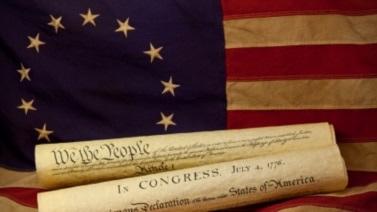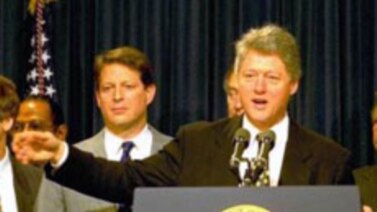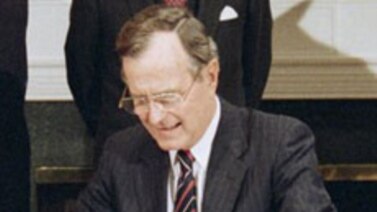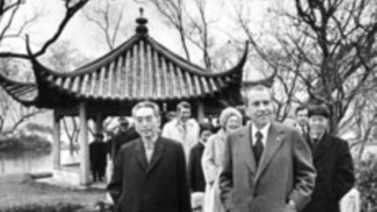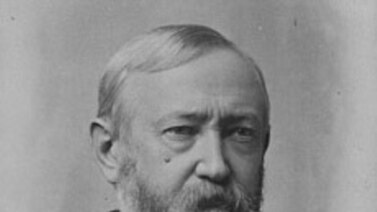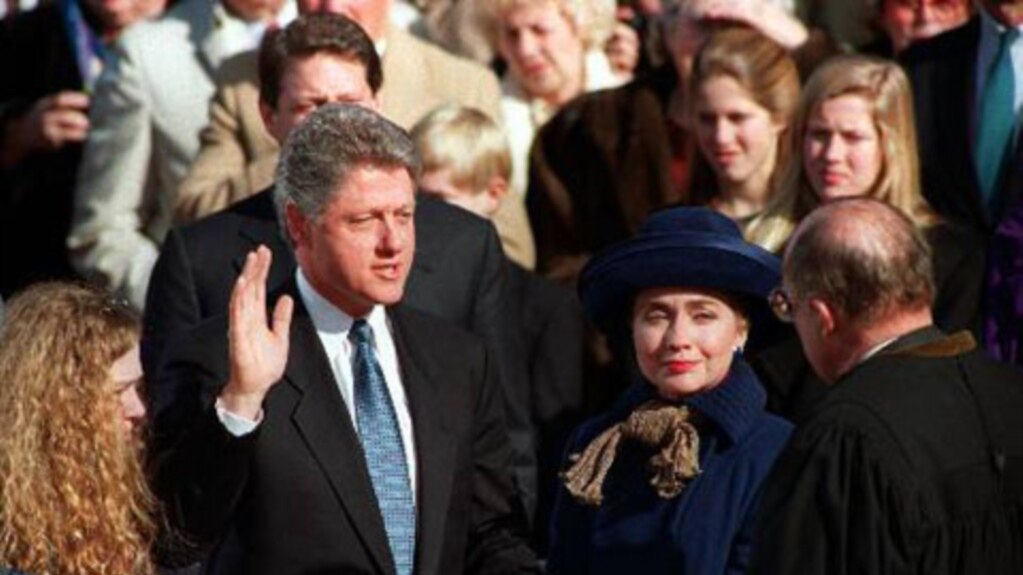
STEVE EMBER: Welcome to THE MAKING OF A NATION – American history in VOA Special English. I’m Steve Ember.
This week in our series, we begin the story of Bill Clinton, America's forty-second president. He led the United States for eight years, from January of nineteen ninety-three to January of two thousand one.
(MUSIC)
Our story begins in nineteen ninety-one. In February of that year, American-led forces won Operation Desert Storm to end Iraqi occupation of Kuwait. Iraqi leader Saddam Hussein considered Kuwait a province of Iraq. He had invaded the oil-rich country in August nineteen ninety. Coalition air strikes began four months later, in January, against Iraqi targets. The ground war took place in February and lasted just four days.
The American-led victory in the Gulf war added to the popularity of President George H.W. Bush.
(MUSIC)
Nineteen ninety-one was also the last year for the USSR - the Union of Soviet Socialist Republic. The collapse of the Soviet Union brought an end. The more than forty years of Cold War tensions and fears of nuclear war.
In the United States, attention was turning to the nineteen ninety-two presidential election. Many political observers believed President Bush would easily win a second term.
But the economy was not doing much to help his chances. The United States went through a serious recession that lasted eight months, from July nineteen ninety to March nineteen ninety-one. Unemployment rose to the highest level in years. At the same time, the federal government was deeply in debt after years of borrowing.
Bush was a Republican. Democrats saw his falling popularity as a good opportunity to retake the White House. They placed their hopes on William Jefferson Clinton. At the time, he was the young governor of the southern state of Arkansas. He was gaining national attention by talking about issues like education.
(MUSIC)
Bill Clinton was born on August nineteenth, nineteen forty-six, in the small town of Hope, Arkansas. His name at birth was William Jefferson Blythe. His father, also named William Jefferson Blythe, was a traveling salesman. He died in a car accident three months before his son was born.
At the age of two, the boy was sent to live with his grandparents while his mother, Virginia Blythe, studied to become a nurse.
She married a man named Roger Clinton when her son was four. The family moved to Hot Springs, Arkansas. When he was fifteen, William Jefferson Blythe legally changed his name to William Jefferson Clinton.
His stepfather drank too much, and was sometimes abusive to him, his mother and his stepbrother, Roger junior. But Bill Clinton did well in school. He also developed a strong early interest in politics and ran for student offices in high school.
In nineteen sixty-three, while still in high school, Bill Clinton went to Washington as a delegate to a Boys Nation program for young leaders. There, he got to meet President John F. Kennedy.
Years later, Richard Stratton, who was president of Boys Nation in nineteen sixty-three, remembered that meeting.
RICHARD STRATTON: “It was a beautiful bright summer day. It was July twenty-fourth, nineteen sixty-three, and we were all assembled in the Rose Garden at the White House as a group, waiting for the president to come out. We all sat there, riveted in attention.”
PRESIDENT JOHN F. KENNEDY: “I want to welcome you to the White House, particularly because this belongs to all of you and because it’s so intimately connected with the best in American history.”
PRESIDENT BILL CLINTON: “I was about the third or fourth person in, and he [JFK] started here and I sort of muscled my way up and made sure I got to shake hands with the president. He was quite generous. He went down the line and shook hands with a pretty good number of us who were there that day.
“It had a very profound impact on me. I think that, you know, it’s something that I carried with me always. And I was very fortunate that someone took a picture of it and gave it to me, so I was always able to remember it.”
RICHARD STRATTON: “Right after that frame -- that famous frame of him shaking hands with JFK – there’s another picture from the same film, showing President Kennedy shaking hands with Jeff Keyes, another one of our boys in from Florida, and Bill Clinton looking down at his hand with this wonderful look, like I’ll never wash it again.”
(MUSIC)
Bill Clinton went on to study at Georgetown University in Washington. He graduated in nineteen sixty-eight and won a Rhodes Scholarship to attend Oxford University in England. He spent two years there before entering Yale Law School in New Haven, Connecticut.
There, he met another law student, Hillary Rodham. She was from just outside Chicago, and she shared his deep interest in politics and public service. They both graduated in nineteen seventy-three. Bill Clinton returned to Arkansas. Hillary Rodham went on to become a lawyer involved in the congressional investigation of the Watergate scandal. That case led to the resignation of President Richard Nixon in nineteen seventy-four.
That same year, Bill Clinton, a Democrat, ran for Congress in Arkansas. He lost a close race to a popular Republican. A year later he and Hillary Rodham married. And a year after that, in nineteen seventy-six, Arkansas voters elected him attorney general, the state's top law enforcement officer.
(MUSIC)
In nineteen seventy-eight, Bill Clinton ran for governor and easily won. He became, at the age of thirty-two, the state's youngest governor ever.
While Bill Clinton was governor, the federal government operated a detention center in Arkansas for Cuban refugees. The refugees rioted. That rioting hurt Bill Clinton politically when he ran for re-election. His opponent argued that he should have done more to get the government to hold the Cubans someplace else. Also, Clinton had supported unpopular new taxes.
In nineteen eighty Bill Clinton was defeated in his campaign for a second term as governor of Arkansas. But he regained the office in the next election two years later. That was before the term of office was increased from two years to four years. Clinton went on to serve as governor of Arkansas until nineteen ninety-two.
While he was governor, education in the state improved. More students finished high school, and more went on to college. The state increased requirements for teachers and also increased their pay. Governor Clinton also expanded early learning programs for children from poor families.
While governor, Bill Clinton also became active in Democratic Party leadership at the national level.
BILL CLINTON: “Make no mistake. This election is about change, change in our party, change in our leadership, change in our nation. And that is why today, I proudly announce my candidacy for president of the United States of America." [Cheering]
In nineteen ninety-one, Bill Clinton announced that he would run for the Democratic nomination for president. His main opponents were Paul Tsongas and Jerry Brown. Tsongas was a former senator from Massachusetts; Brown had been governor of California. Paul Tsongas later withdrew, and Bill Clinton easily defeated Jerry Brown for the nomination.
(SOUND: Delegates cheering)
Democrats held their national nominating convention in New York City in July nineteen ninety-two.
BILL CLINTON: "And so, in the name of all those who do the work, pay the taxes, raise the kids, and play by the rules; in the name of the hard-working Americans who make up our forgotten middle class, I proudly accept your nomination for president of the United States.”
Bill Clinton chose Senator Al Gore of Tennessee as his running mate for vice president.
(MUSIC)
The Republicans nominated President Bush and Vice President Dan Quayle for a second term.
Another candidate in the nineteen ninety-two presidential election was a Texas businessman named Ross Perot. He competed as an independent, a so-called third party candidate. His choice for vice president was James Stockdale, a former high-level Navy officer and pilot. He had been shot down and held as a prisoner of North Vietnam for seven years.
During the campaign, Ross Perot argued that neither of the major candidates was taking the national debt seriously enough. He also warned of the loss of American jobs.
ROSS PEROT: “To those of you in the audience who are business people, [it’s] pretty simple. If you’re paying twelve, thirteen dollars, fourteen dollars an hour for factory workers, and you can move your factory south of the border, pay a dollar an hour for your labor, have no health care -- that’s the most expensive single element in making a car -- have no environmental controls, no pollution controls, and no retirement, and you don’t care about anything but making money, there will be a giant sucking sound going south.”
(MUSIC)
Bill Clinton criticized President Bush for not doing more about the economy and unemployment.
Bush pointed out that the Democrats controlled Congress, and he said the Democrats had defeated most of his proposals.
The president also talked about his foreign policy successes. And -- most famously -- he promised not to raise taxes.
PRESIDENT GEORGE H.W. BUSH: “My opponent will not rule out raising taxes, but I will, and the Congress will push me to raise taxes, and I’ll say ‘No.’ And they’ll push again, and I’ll say ‘Read my lips – no new taxes.’ [Cheering]"
But raise taxes he did, and many Americans remembered that on Election Day.
(MUSIC)
Bill Clinton and Al Gore won the nineteen ninety-two election. They received about forty five-million votes, or six million more than President Bush and Vice President Quayle. Ross Perot and James Stockdale received close to twenty million -- or nineteen percent of the popular vote.
Bill Clinton became America’s forty-second president on January twentieth, nineteen ninety-three. At the age of forty-six, he was the third youngest person ever elected president.
At his inauguration, the new president said there was no longer a division between foreign and domestic issues.
BILL CLINTON: "The world economy, the world environment, the world AIDS crisis, the world’s arms race -- they affect us all. Today, as an old order passes, the new world is more free but less stable. Communism’s collapse has called forth old animosities and new dangers. Clearly America must continue to lead the world we did so much to make.”
(MUSIC)
But, even as he took office, critics were questioning Clinton's character. There had been accusations during the campaign about relationships with other women in Arkansas. And there were questions about an investment that he and Hillary Clinton had made in a land development project back in nineteen seventy-eight.
President Clinton's first term in office will be our story next week.
You can find our series online with transcripts, MP3s, podcasts and pictures at voaspecialenglish.com. You can also follow us on Facebook and Twitter at VOA Learning English. I’m Steve Ember, inviting you to join us again next week for THE MAKING OF A NATION -- American history in VOA Special English.
(MUSIC: "Don't Stop"/Fleetwood Mac)
Contributing: Jerilyn Watson
This was program #228. For earlier programs, type "Making of a Nation" in quotation marks in the search box at the top of the page.
